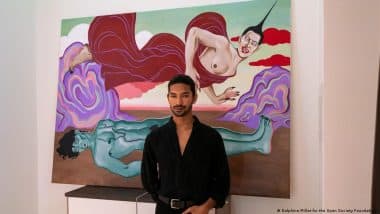Myanmar's military junta has been abducting, torturing and murdering its own population for two years. Politically active artists usually have no choice but to flee; now their works can be seen in Berlin.The oil painting that opens the exhibition has a spectacular journey behind it: rolled up and disguised as hand luggage, it was recently smuggled out of Myanmar. Titled "Bitch better have my democracy," it's a striking and colorful work by artist Richie Htet, who painted it soon after Myanmar's military coup in February 2021. "I wanted to encourage us at that time. There were a lot of images of the atrocities circulating on the Internet. I wanted to create something triumphant," Htet tells DW. When he posted it on social media, the image immediately went viral.
Today, the painting is considered an icon of courageous protests against the military dictatorship that have resulted in the deaths of thousands of people and forced some 1.5 million to flee the country. Htet's painting shows the dark-haired beauty Mie Bamar Pyi, a personification of Myanmar, bearing a shield in one hand and a spear in the other. She attacks an Ogre, a demon from Buddhist mythology, who is dressed as a general from Myanmar's military junta. The motif references both Asian and Western icons: it quotes the battle of the Hindu goddess Durga against a demon, while also calling to mind Christian depictions of the Archangel Michael defeating Satan.
Also Read | Business News | Cientra Appoints Anil Kempanna as New CEO.
Artists are particularly vulnerable
For painter Richie Htet, the work represents the collective effort of Myanmar's people to fight the military junta. So for Li Li, co-organizer of the exhibition, "We Are the Seeds: The Art of Myanmar's Spring Revolution," it's a small miracle that this painting can be seen until July 21 at the Open Society Foundation in Berlin. "If the painting had to be rolled out at airport security when it left the country, our contact probably would have ended up in jail," Li Li tells DW.
The exhibition includes works by 18 Myanmar artists, most of whom live in exile in Paris, like co-organizer Li Li and Richie Htet. With the wide-ranging show featuring paintings, installations, sound and video, Li Li wants to draw attention to the civil war that has largely been forgotten in Europe. "The military already had experience; this is now the third coup. From the past, they knew about the power that can come from artists during protests. That's why they were and are particularly vulnerable."
The 29-year-old Htet is considered a promising painter in Myanmar's contemporary art scene, which gained international attention following the democratization of the country in 2011. He grew up under the military dictatorship and outed himself as gay at just 14 years old — an act of bravery, since homosexuality, while not illegal in Myanmar, is considered "unnatural" in the country. After studying in London, Htet returned to Yangon, where he became the art director of a fashion magazine.
The first queer exhibition in Myanmar
It was a time of awakening and sheer unbridled creativity. Htet began to paint homoerotic images that played with Indian and South Asian mythologies, which, from his point of view, are rich in queer characters. In his first solo exhibition, "A Chauk" (a Burmese epithet for homosexual men), he showed women in positions of power and naked men as objects of desire at the gallery Myanm/art in 2020.
The first queer exhibition in Myanmar became a success: all of Htet's paintings sold and he decided to live exclusively from his art. Then, in February 2021, the violent military coup d'etat ended not only his dreams but also Yangon's diverse cultural life. "I was quite devastated. I felt like the future was sort of ripped away from me, because I was planning on living and working in Yangon. I was planning on making it my home."
After both Htet's brother, who was caught with protest posters, and his mother were imprisoned, he saw only one way out: escaping to France with the help of an artist scholarship. "When I left, my father was super sick at that point, so I knew that when I said goodbye to my father, it was the last time I would see him." His father died the next year.
Artists in exile: audible burns
The artist and musician Pinky also decided to leave Myanmar in spring 2021. Her bandmate was arrested and his laptop, on which joint protest actions were stored, was confiscated. Pinky Htut Aung waited in Bangkok for several months until she, too, was able to take up a scholarship in Paris. Now, like Richie Htet and Li Li, she can stay permanently as a political refugee. "Of course, I would prefer to go back. But as the eldest daughter, I also have a responsibility for my family now," she says. From France, she tells DW, she can better support her parents and younger sister.
Pinky is a multifaceted artist. The 31-year-old composes music, paints and works with sound collages. For the Berlin exhibition, she devoted her attention to clouds. "I've been obsessed with clouds since I was a child. They're very spiritual for me. They never die, and they transform, just like our spirit."
Her milky, translucent work hangs freely from the ceiling, accompanied by celestial sounds. The clouds are not painted but instead burned into thick translucent paper with the help of a candle. "I was afraid I would set my small apartment on fire in the process," she says. Pinky says she made a conscious decision to experiment with fire for the piece: "In Paris, of course, I follow the events in Myanmar. On my smartphone, I see something on fire all the time."
Deep descent into depression
Pinky says when the military junta regained power in 2021, she, her sister and her father all fell into depression. Only her mother, with unimaginable strength, kept the family together. Her father in particular was deeply affected. Zaw Myo Htut is a well-known rock musician in Myanmar. What in Europe sounds like an exciting way of life was in Myanmar a rather courageous, subversive decision until democratization in 2011. Everything he and his band stood for, whether it was leather jackets or long hair, was forbidden under the military government. "At the time, my father's concerts were among the first where the audience could stand and not sit," Pinky says.
Her father's courage was an early influence on her. "I have a little rebel in me. Like my artworks: they're about spirituality, and at the same time, rebelling against the system all the time." Pinky says her father is still suffering from depression. "He can only do small gigs in bars to make any money at all," she says.
A country once again paralyzed by fear
"People across the board in Myanmar are afraid," says Franz Xaver Augustin, who was able to reopen the Goethe-Institut in Yangon in 2014 after several years of preparation, and served as its director until 2019. "I experienced Myanmar before it opened in 2011. It was terrible, an atmosphere of fear." During the period of democratization, the Institute was an important resource for artists, and it remains a refuge for them these days. Augustin has accompanied some of the artists now exhibiting in Berlin from the beginning. At the time, he would not have thought it possible that they would soon have to flee their country.
Richie Htet has been politicized by the military coup. In addition to homoerotic images, his work now deals with the civil war in his country.
The military's tactics have become more brutal during the course of the war — using sexual violence and wiping out entire villages. In addition, decapitated and dismembered bodies have been found, some of which had been disemboweled.
The Berlin exhibition features a disturbing painting by Htet, "Autopsy of the Irrawaddy," depicting a sewn-up corpse. "I want to show the atrocities the army is committing against the population," he says.
Artists like Richie Htet and Pinky initially stood stunned and speechless before these atrocities. They belong to the generation that blossomed with the opening of their country — and whose trust was shaken to the core after another military coup. With their paintings and installations, they have found their voices again. And they will not stop using them to speak out about the civil war on their own terms.
Edited by: Jon Shelton
(The above story first appeared on LatestLY on Jul 20, 2023 05:10 PM IST. For more news and updates on politics, world, sports, entertainment and lifestyle, log on to our website latestly.com).


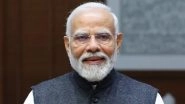

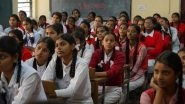
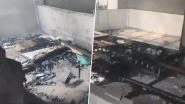
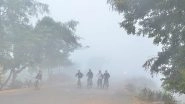

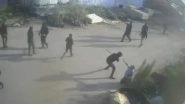
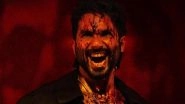



 Quickly
Quickly